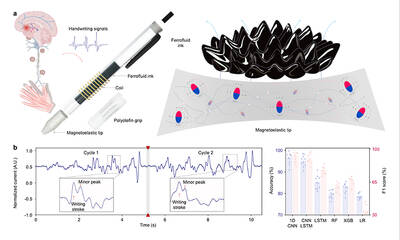A: According to the 2024 TOEIC score statistics, Taiwanese scored an average of 315 points in listening and 265 points in reading. So the total average score rose by 13 points to a new high of 581 points.
B: Taiwan’s total was slightly higher than Japan’s 564 and China’s 561, but much lower than South Korea’s 678. India actually scored the highest in Asia at 772.
A: Since Taiwan’s universities cut English courses to save money, university students’ average of 585 was even lower than high school senior students’ average of 661.

Photo: Avery Tsou 照片:鄒政威
B: Cram school English teacher Avery Tsou shared some tips for test-taking. For listening: stay focused on the opening of each question, since the crucial information in English questions usually appears at the beginning. For reading: scan for the main structure of each sentence, so you can grasp the overall idea of a passage more quickly.
A: Plus, don’t forget to read the Taipei Times, Taiwan’s only English newspaper, every day.
A: 多益測驗2024年統計︰台灣聽力315分、閱讀265分、總分581分進步13分再創新高。
B: 台灣小贏日本(564分)、中國(561分),大輸南韓(678分),而亞洲英文最強的則是印度(772分)。
A: 但近年來許多大學大砍英文課來省錢,大學生585分比高三生661分還差耶。
B: 英語補教名師鄒政威近日分享考多益的秘訣:考聽力要專注聆聽每題的開頭,因為英文疑問句重點在一開始。考閱讀要先掃描整句的主結構,快速掌握全文主旨和文章脈絡。
A: 別忘了還要多看台灣唯一的英文報紙:《台北時報》!
(By Eddy Chang, Taipei Times/台北時報張迪)

A: Apart from Twice, hip-hop trio Black Eyed Peas, a folk music festa, Japanese virtual singer Hatsune Miku, and K-pop boyband NCT will all visit Taiwan. B: Black Eyed Peas once rocked Taiwan in 2006. I love their hits, such as “I Gotta Feeling,” “Boom Boom Pow” and “Where Is The Love?” A: The upcoming Taipei Dome Eastwave festa celebrating 50 years of folk music sounds like fun, too. B: The seven-hour-long concert is scheduled from 3pm to 10pm on Saturday. A: I hear over 60 artists are going to perform more than 100 unforgettable classic folk songs. A:

A document long considered an unofficial copy of the “Magna Carta” has been identified as a rare original issued by King Edward I in 1300. Tucked away in Harvard Law School’s library, the manuscript was acquired in 1946 for a mere US$27.50. Medieval history professors from King’s College London used ultraviolet light and spectral imaging to analyze the faded text. They found that the handwriting, wording, and word order perfectly match those of the six other surviving charters from that year. The Magna Carta was the first document to formally assert that the king is subject to the law. It remains a

For technology adopters looking for the next big thing, “agentic AI” is the future. At least, that’s what the marketing pitches and tech industry T-shirts say. What makes an artificial intelligence product “agentic” depends on who’s selling it. But the promise is usually that it’s a step beyond today’s generative AI chatbots. Chatbots, however useful, are all talk and no action. They can answer questions, retrieve and summarize information, write papers and generate images, music, video and lines of code. AI agents, by contrast, are supposed to be able to take actions autonomously on a person’s behalf. If you’re confused, you’re not alone.

A groundbreaking AI-powered pen developed by researchers at the University of California, Los Angeles (UCLA), could revolutionize the early diagnosis of Parkinson’s disease. This innovative device detects subtle changes in handwriting, a key indicator of the neurodegenerative disorder. The pen uses magnetic ink and a specialized tip to convert hand movements into electrical signals. These signals are then analyzed by an AI system, which can distinguish Parkinson’s-related handwriting patterns from healthy ones with over 95% accuracy. This low-cost, accessible technology holds promise for widespread screening, particularly in areas with limited medical resources. By enabling early detection and intervention, the